If you're seriously getting into your knitting or crochet, then maybe you've though about investing in a yarn winder. Well, it's a piece of kit that TikTok has been raving about this month, and for very good reasons. So, what exactly is a yarn winder, and how will it transform your crochet-game?
The term generally refers to machines that are used to wind yarn into a ball, but people do use the term to refer to a couple of different products, which can be used separately or combined. Crafting TikTok (or CraftTok if you fancy) is awash with yarn winder gadgets, but one of the biggest trends is using a yarn butler, as seen below.
Yarn Holder / Yarn Butler / Yarn Spinner / Yarn Winder / AKA Your New Best Friend
Premium Spinning Yarn Holder
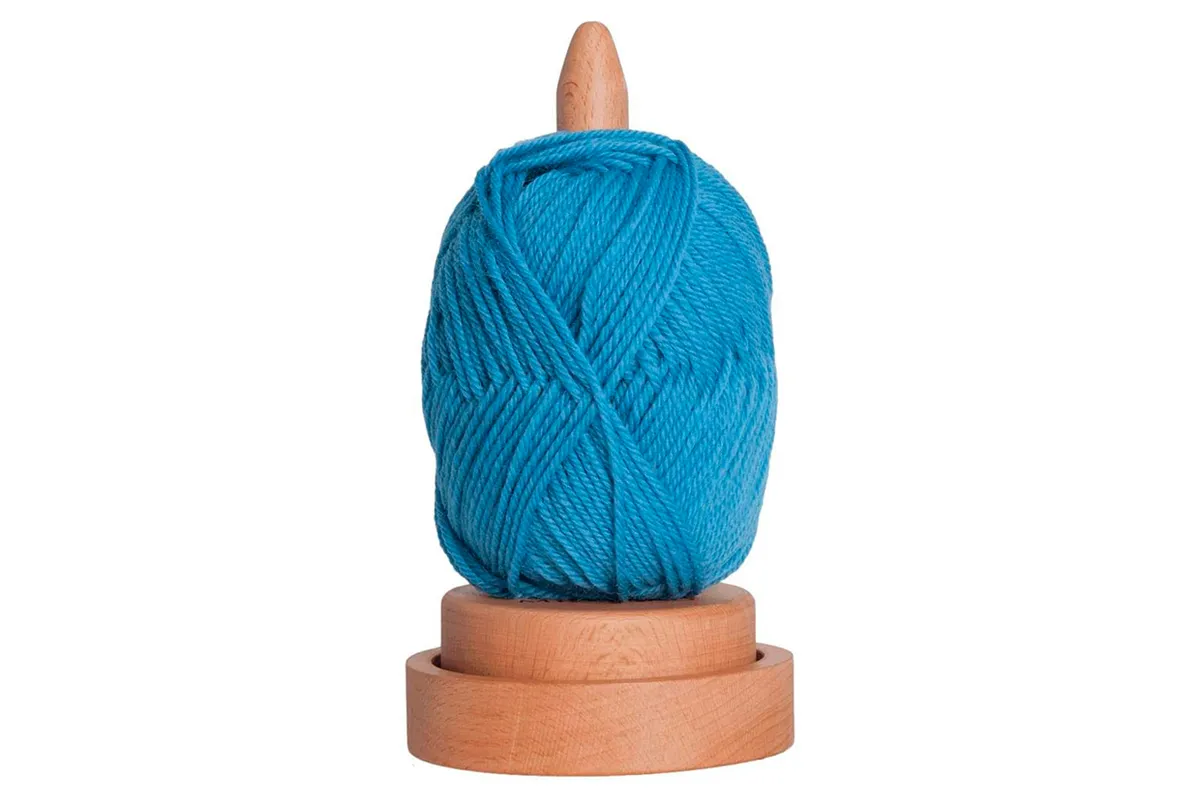
Yes, you did read that correctly, this handy product is indeed called a yarn butler. While it technically isn't a yarn winder in the conventional sense of the word, it will make your life easier when winding off your ball of yarn while knitting or crocheting. It can also be referred to as a yarn spinner.
You essentially place the centre of your yarn ball onto the dowel, then as you work your knitting or crochet the butler spins around freely, giving you more yarn as you need it. It has a wide and heavy base to keep it from losing balance, as well as some rubber pads on the base to keep it from sliding about on your surface.
It's a clever way of keeping your yarn in one place - no more yarn balls rolling around on the floor! If only this butler would bring us tea and answer the door as well!
Shop the Premium Spinning Yarn Holder here

Some of the biggest TikTok sewers and knitters are in on the trend, with @crochetbylauragrace opting to call a yarn spinner 'the best crochet purchase I've ever made'. She opted for a banana-hook style, held together by magnetic force. You can shop it on Amazon for just £22.99.

Or, if you're wanting to try something a bit more unique, Etsy is choc-a-block with interesting yarn winder and yarn holder designs. For example, Etsy shop AsteriStudios sell these gorgeously fun heart-shaped holders on sale, but also has a cake design that is to die for.
Are you looking for a traditionally defined yarn winder? Read our full guide below.
Quick recommended yarn winders
- Best budget yarn winder - Trintion Yarn Winder
- Best yarn winder bundle - LAMXD Yarn Winder and Umbrella Yarn Swift Bundle
- Best luxury yarn winder - KnitPro Wooden Yarn Winder
There are a few yarn winder options available, which mostly fall into these 3 categories.
Types of yarn winder
Wool Winder or Yarn winder - These are little machines that enable you to wind yarn into a handy ball. They're normally used in conjunction with a yarn swift to turn a skein of yarn into a ball, but can also be handy for if you want to separate a ball of yarn into smaller balls or combine two yarns into one single ball.
They have a few different names - wool winder, yarn winder, yarn spinner - and there are a couple of variations on the style, but they all serve the same function at the end of the day!
Yarn Swift - A yarn swift is typically used for transforming a skein into a ball of yarn. There are a few different types available, but they all work on the same basic principle. You unfurl the skein so it's one big loop, then place it onto the swift where you can wind it off without it getting tangled.
Other types of yarn winder - As well as yarn swifts and yarn ball winders, there's also a few more fun yarn winder products that you might not have come across, such as Nostepinnes and yarn butlers!
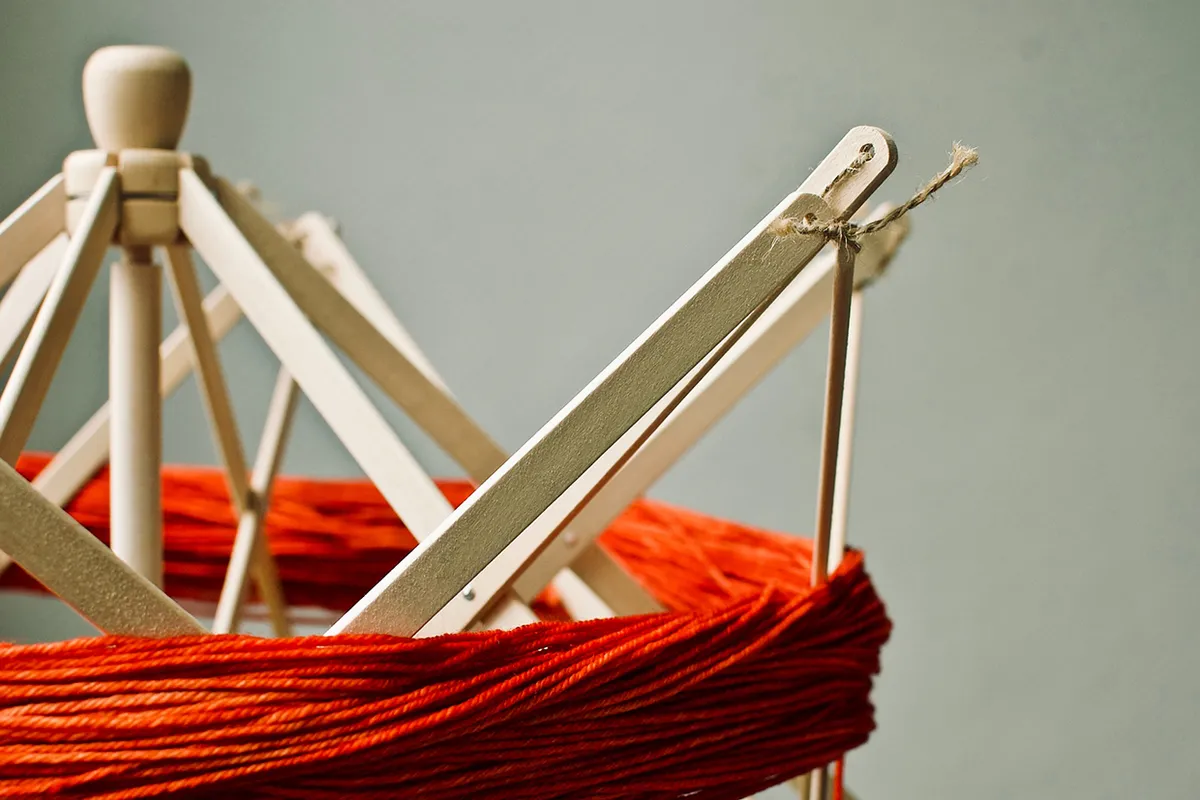
Is a yarn winder worth it?
You may have been crocheting or knitting for a while and been getting on just fine, and yarn winders are somewhat of an investment - so is a yarn winder and swift worth it?
It all comes down to one main question - do you use yarn skeins (or hanks as our friends in the US call them)? If your answer is yes, then a yarn winder is definitely something you should invest in. Sure, you can unwind skeins using the back of a chair or by having someone else hold the yarn while you unwind it – but it's fiddly, time consuming and no matter how careful you are it's still far too easy to your yarn snagged or in a big mess.
And if you're thinking about just working straight off the skein - we'll stop you right there, that's a recipe for disaster! The basic construction of a yarn skein is that all of the yarn is wrapped round and round in a big loop, but the strands can cross over each other or the fibres can catch themselves to each other - so all you need to do is pull on your yarn a bit too quickly and uh-oh - you've got it twisted in a big knot that you'll spend the next hour trying to undo!
This is why most knitters and crocheters will use a yarn winder and swift for unravelling skeins - it make things far simpler and allows you to unravel that skein one loop at a time. While you don't have to use both together (for example, you could put your skein on a swift and wind it off by hand, or you could just use your wool winder for dividing large balls into smaller balls), it will not only make your life easier to use both in conjunction with each other, but it's also a really satisfying process.
We've picked out some of the best yarn winders and best yarn swifts available, as well as some extra fun products that you can also use for winding yarn!
Best Yarn winders
Trinton Basic Yarn Winder
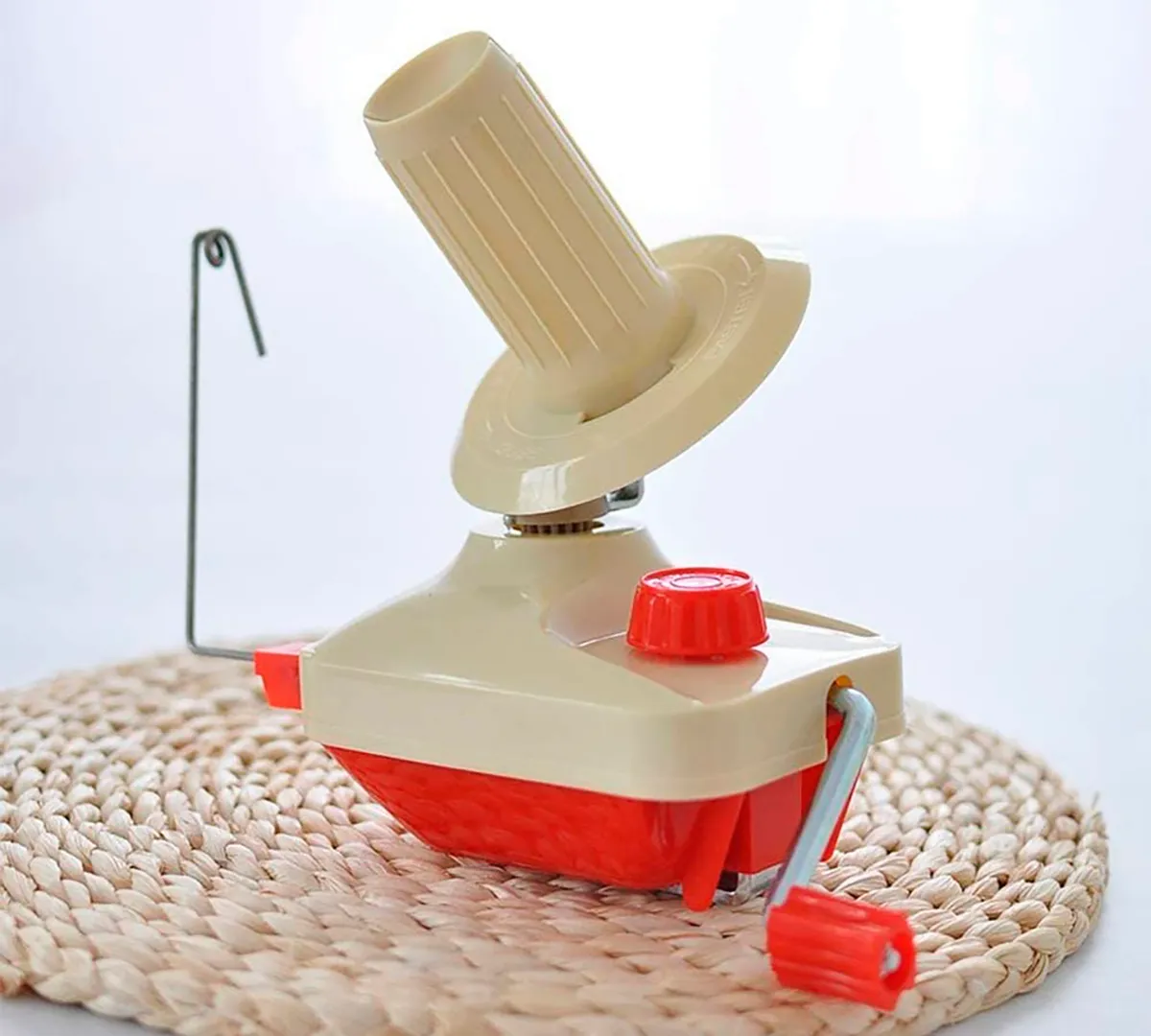
- Pros Affordable, standard design
- Cons The metal arm for holding the yarn isn't terribly sturdy, plastic design.
This basic yarn ball winder is an affordable option for knitters and crocheters, and is the most common type of yarn winder that you might come across. As with most basic yarn winders, you use the screw clamp to attach the yarn winder to your table, insert your yarn through the metal eye and into the notch on the top of the spool, then you just turn the hand crank to wind your yarn into a handy yarn cake.
From our own experience with this yarn ball winder it does require a bit of practice - the metal eye that the yarn is threaded through moves to make it easier to pack away, so you need to make sure this is locked into place before winding. The spool is also removable, which is a handy feature for if your yarn goes rogue and accidentally gets caught in the cogs - which doesn't happen often but is easy to do if you're not paying attention.
It's a great little machine for those on a budget looking to get their first yarn ball winder!
Shop the Trinton Basic Yarn Winder here
LAMXD Yarn Winder and Swift Bundle
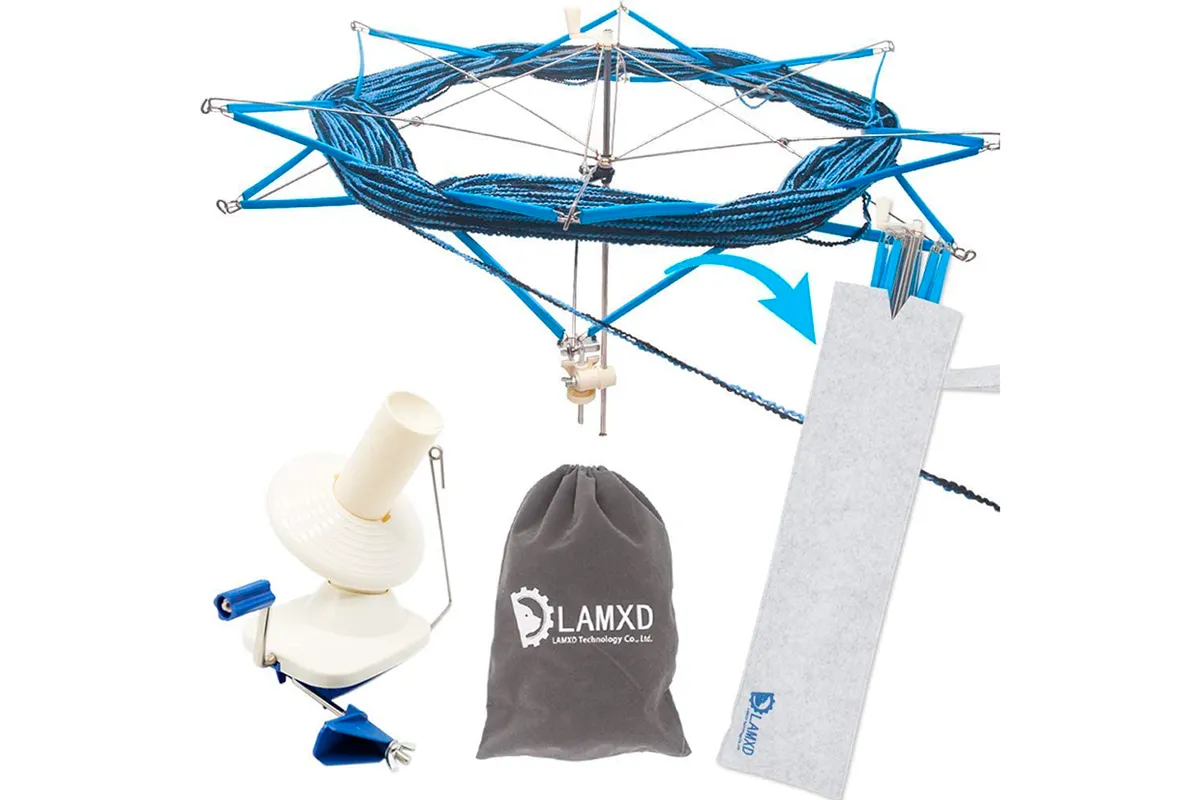
- Pros Everything you need to start unwinding skeins, lightweight
- Cons Plastic swifts can feel a bit flimsy and can easily catch.
You'll need to use a yarn swift in conjunction with your yarn winder, and we'll cover some of the best yarn swifts in more detail below, but if you're in need of both a yarn winder and swift, why not save some pennies and buy both together with this fab bundle by LAMXD. It includes an umbrella-style yarn swift which nicely folds away into a handy pouch for storage, and a yarn ball winder which again comes with a handy storage pouch.
The addition of storage pouches is a nice touch, as most people won't want their yarn swift and yarn winder set up all the time, so they'll help to keep them clean and dust-free, and especially with the swift will help to prevent is getting caught or damaged.
It's a brilliant yarn winder and swift kit for both new and more experienced knitters and crocheters alike!
Shop the LAMXD Yarn Winder and Swift Bundle here
KnitPro Yarn Winder
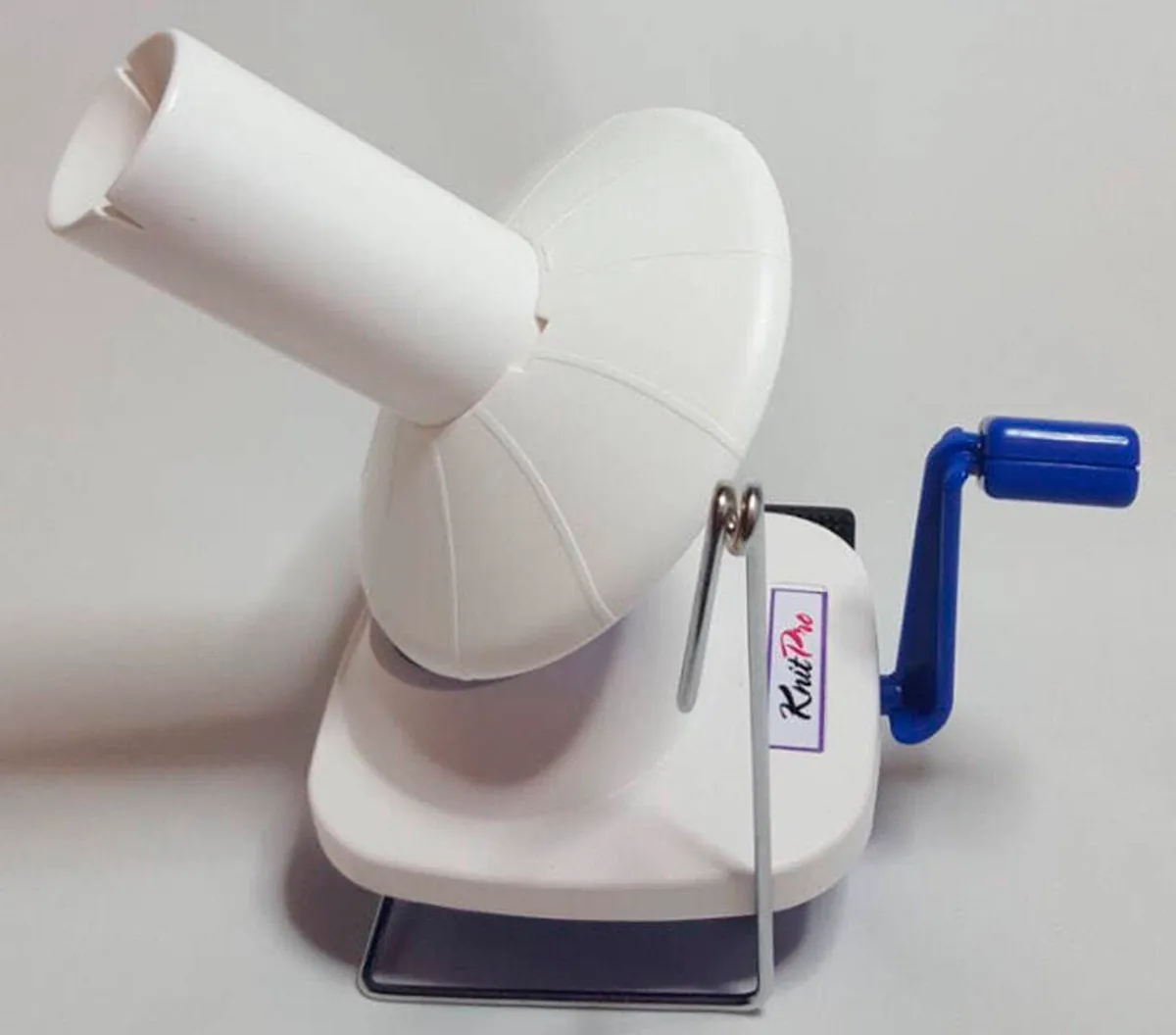
- Pros Solid design, fixed position metal yarn arm
- Cons Plastic design
If you're after a basic yarn winder but prefer to trust in one made by a well-known brand, then this KnitPro yarn ball winder is the perfect choice for you!
Lightweight and compact, once you invest in this handy tool you'll wonder how you ever managed without it!
Shop the KnitPro Yarn Winder here
Large Yarn Ball Winder
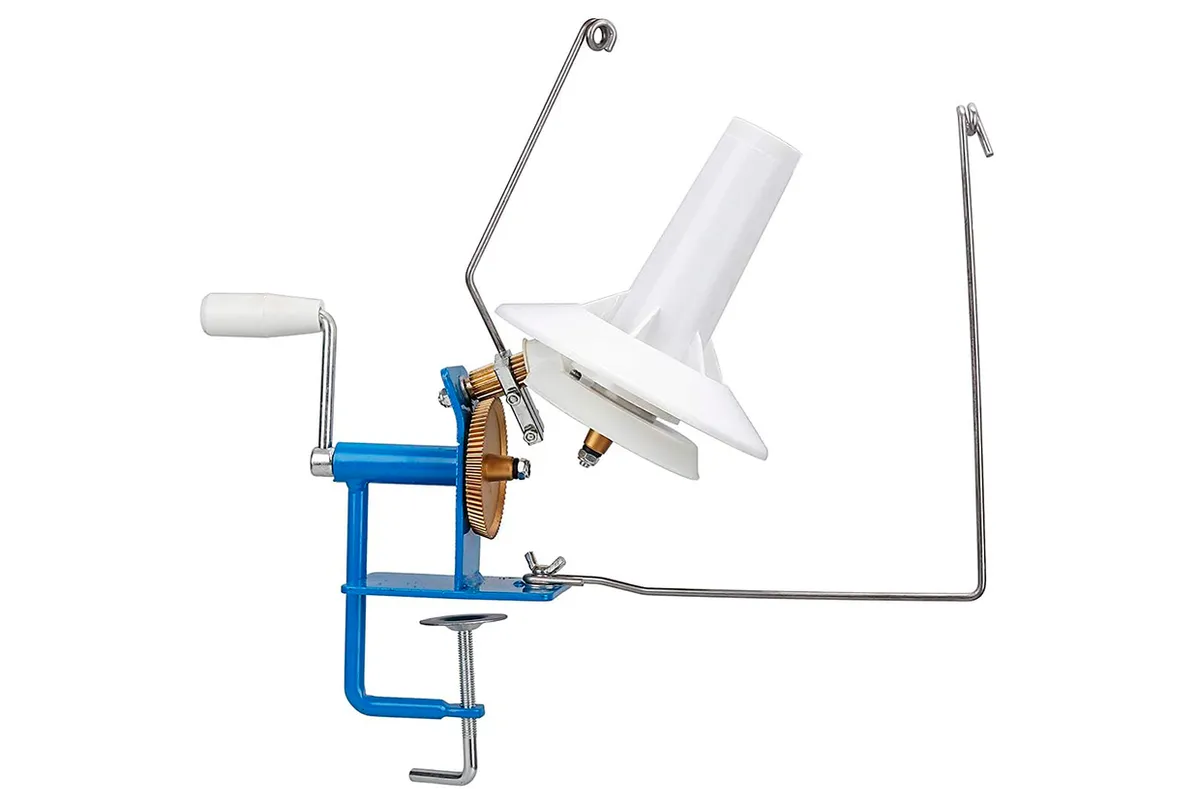
- Pros Sturdy metal construction, great for making large yarn cakes
- Cons Not the prettiest product, trickier shape for storage
While the basic yarn ball winders we've covered so far will suit the needs of most knitters and crocheters, you will be limited by the size of skein you can wind onto a ball (they can normally handle most 100g skeins).
If you're looking to wind on particularly large or chunky skeins, then this large and sturdy metal yarn winder gives you more space to work so you can make up to 10 ounce yarn cakes (approx. 280g).
Shop the Large Yarn Ball Winder here
KnitPro Wooden Yarn Winder
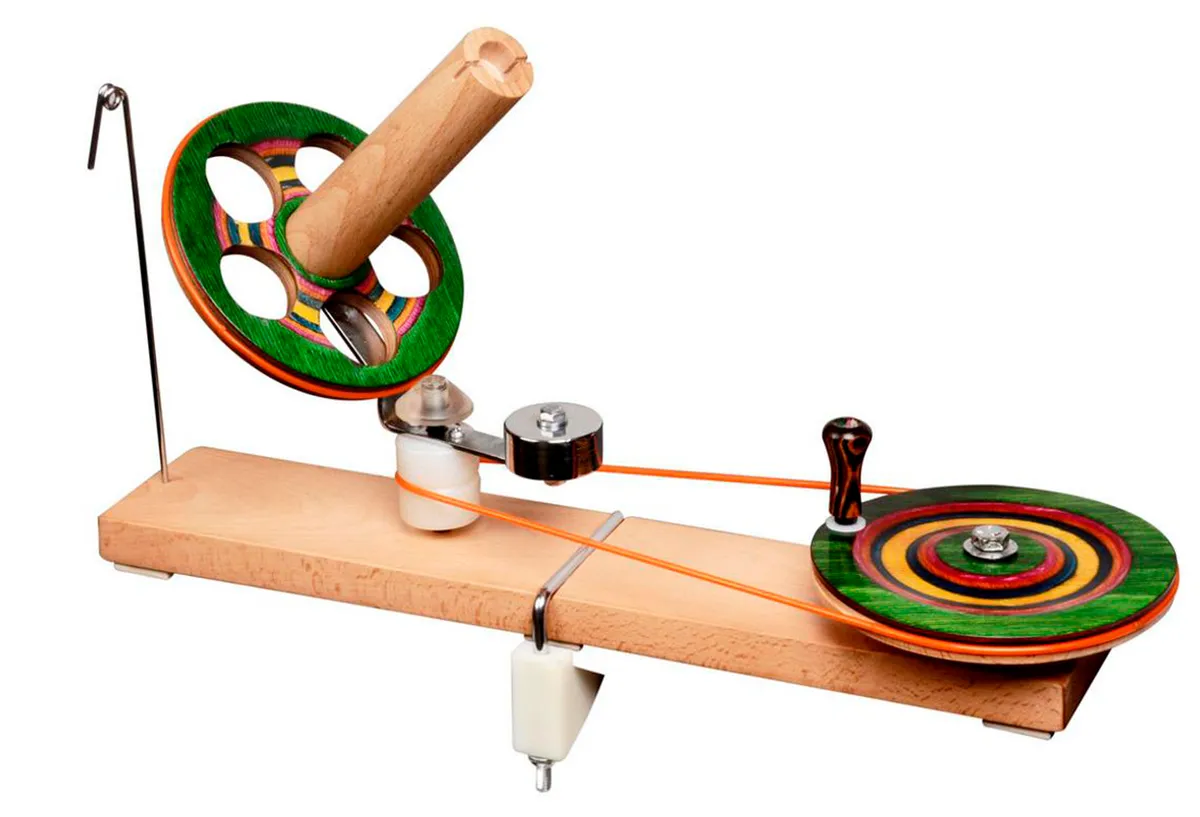
- Pros Funky colours, quality parts, trusted Knitpro brand
- Cons Large item, high price
Once again we've found a fantastic yarn winder produced by the reputable KnitPro for those of you who are prepared to invest a little bit more for guaranteed quality!
This fabulous funky yarn ball winder is from KnitPro's Signature Symfonie range, which uses colourful laminated Birch wood. This tabletop wool winder enables you to wind large skeins into yarn balls, up to an impressive 450g of 4ply yarn. High quality parts and nice touches like anti-skid rubber pads to make sure it doesn't slip or scratch your table make this a yarn winder that you'll definitely be glad you invested in!
KnitPro Wooden Yarn Winder
Caydo Electric Yarn Winder

- Pros Minimum effort
- Cons Not really for hobbyist knitters or crocheters, more useful for yarn producers/spinners/dyers
Ok so we know that this Electric yarn winder is maybe a bit over-the-top for your average hobbyist knitter or crocheter, but if you're a yarn spinner or dyer then this might just be the product you've been dreaming of! It will wind 100g of yarn into a ball with a flick of a switch - no more sore arms from all that hand-cranking!
Shop the Caydo Electric Yarn Winder here
Get ready to be bowled over!
These handy bowls keep your yarn in place and are available in a huge range of designs and styles. Check out our list of the best yarn bowls for knitting and crochet to find the perfect yarn bowl for you!
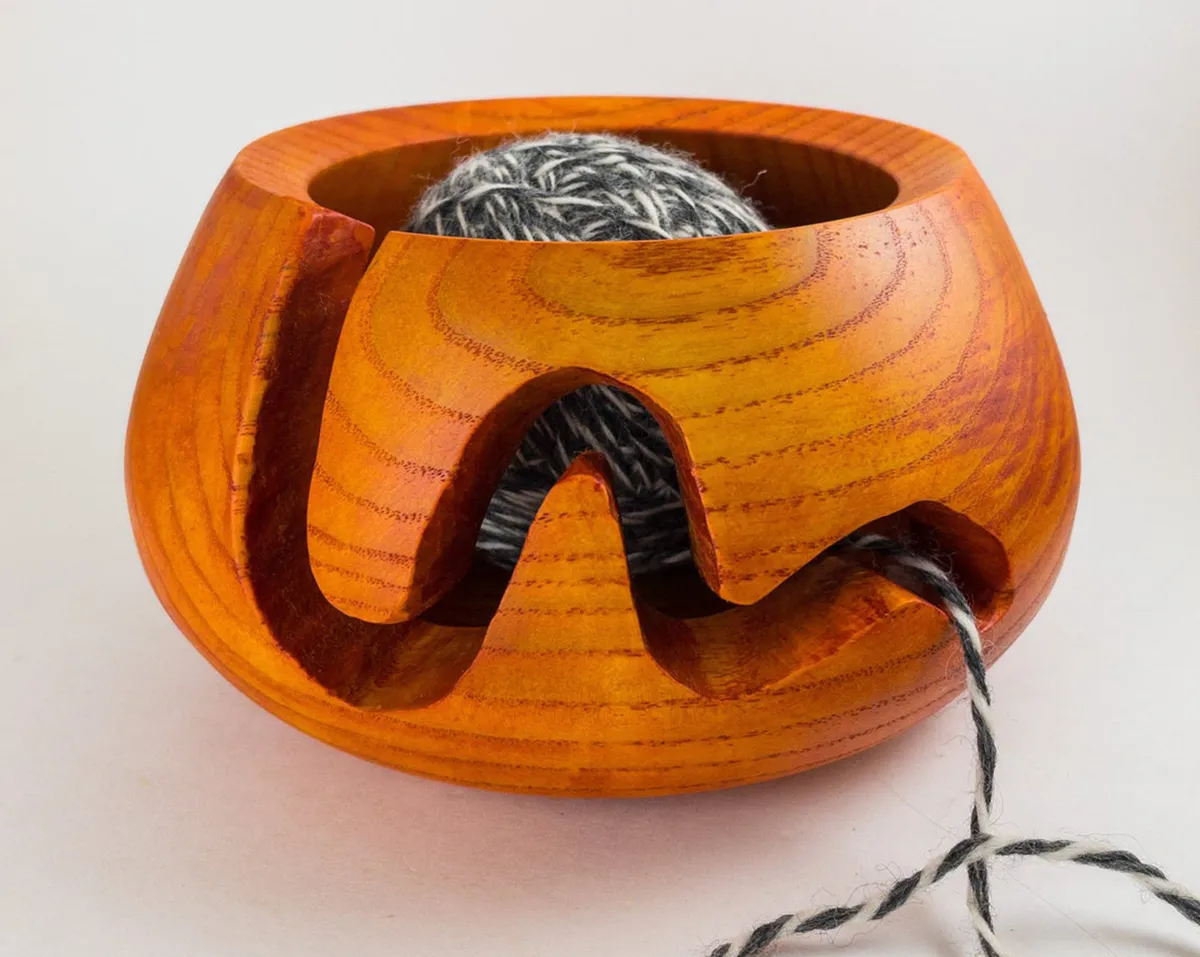
Best Yarn Swifts
Now that you've taken a look at our pick of yarn ball winders, we'd strongly recommend that you invest in a yarn swift too! Yarn swifts are a tool that will essentially hold your skein while you unwind it, and trust us, they're an essential for anyone wanting to use skeins.
Plastic Umbrella Yarn Swift

- Pros Affordable, includes handy storage case
- Cons Plastic design
This knitting umbrella style yarn swift is a great budget option for those in need of their first yarn swift.
The Umbrella design means it's easy to collapse and store out of the way (in it's handy storage box), plus as it's made from plastic and metal it's super-lightweight - which means you can get it spinning super-quick while you wind your yarn!
Shop the Plastic Umbrella Yarn Swift here
She-Lin Wooden Umbrella Yarn Swift
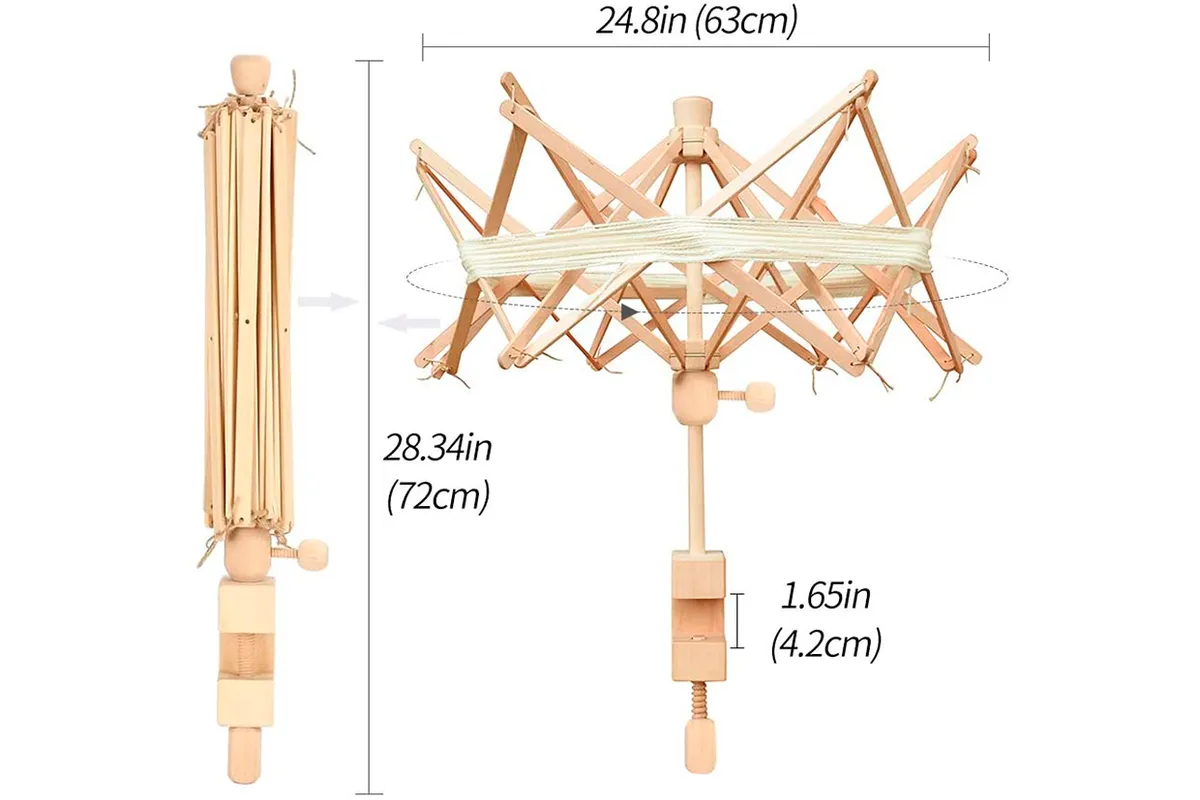
- Pros Natural wood, sturdy wooden design
- Cons String connections could be troublesome, unknown brand.
While the above metal and plastic yarn swifts are great options for those on a budget, if you're after something a bit sturdier you can always go for a traditional style wooden yarn swift!
This Birch wood yarn swift has been highly sanded to ensure it doesn't snag on your yarn, and features a nice chunky block clamp for attaching to your table, so no matter how fast you spin your swift it should be nice and secure!
Shop the She-Lin Wooden Umbrella Yarn Swift here
Amish-Style Table Top Yarn Swift
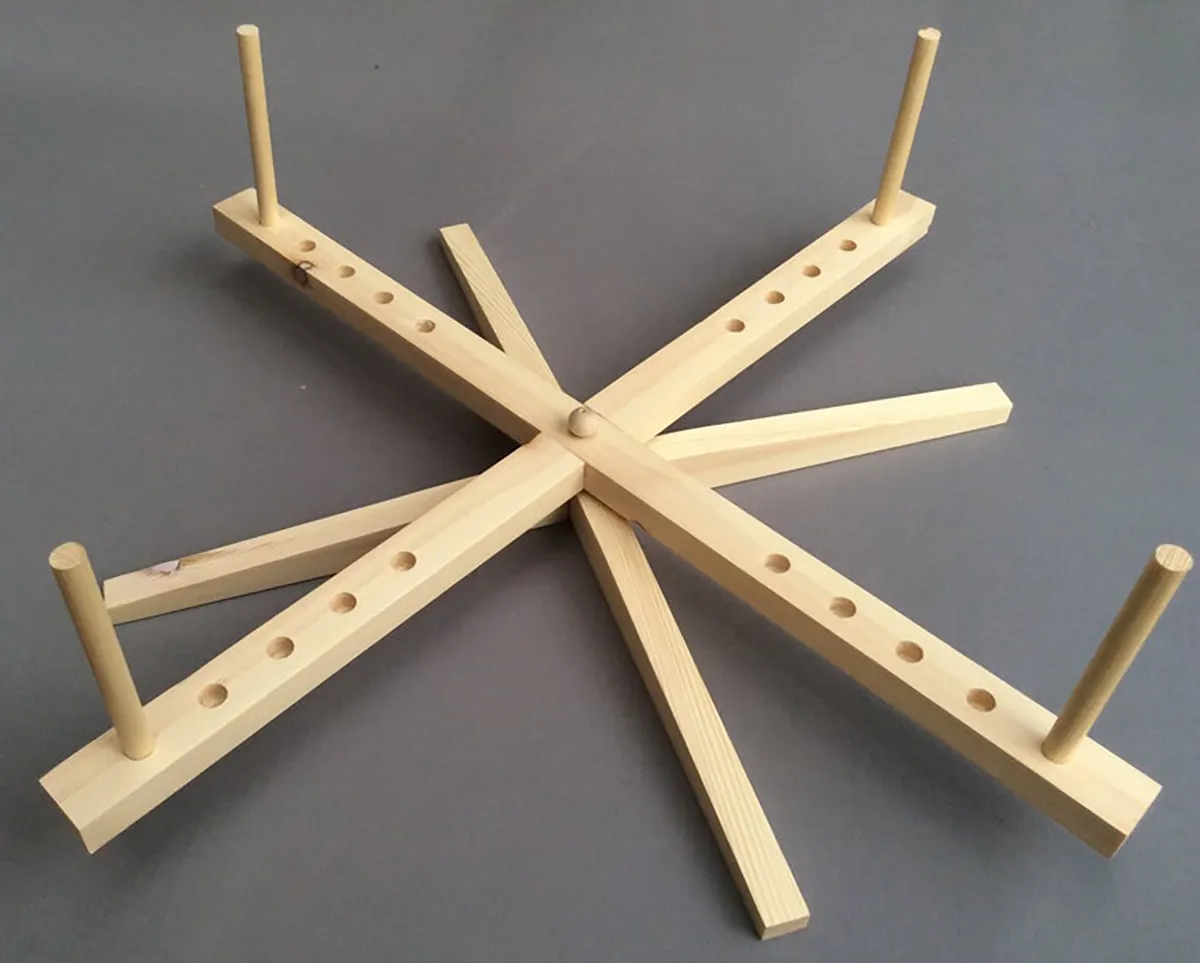
- Pros Solid handmade build, simple design
- Cons Requires table top/floor space (but can be disassembled for storage)
Also known as an Amish yarn swift, these table top style yarn swifts are perfect for people who don't get on with the knitting umbrella style swifts. As they sit flat on your table, you won't get any wobbles in your spin, and it's handmade from sturdy pine wood and can be fully dismantled so you can easily store it away when you're not using it.
With knitting umbrella style swifts, you expand the swift to suit the size of your skein loop - but with this table top style, you simply move the pegs to the size you need (plus you can also use it for really long skeins with some additional pegs and clever wrapping).
Shop the Amish-Style Table Top Yarn Swift here
KnitPro Skein Winder Natural Swift
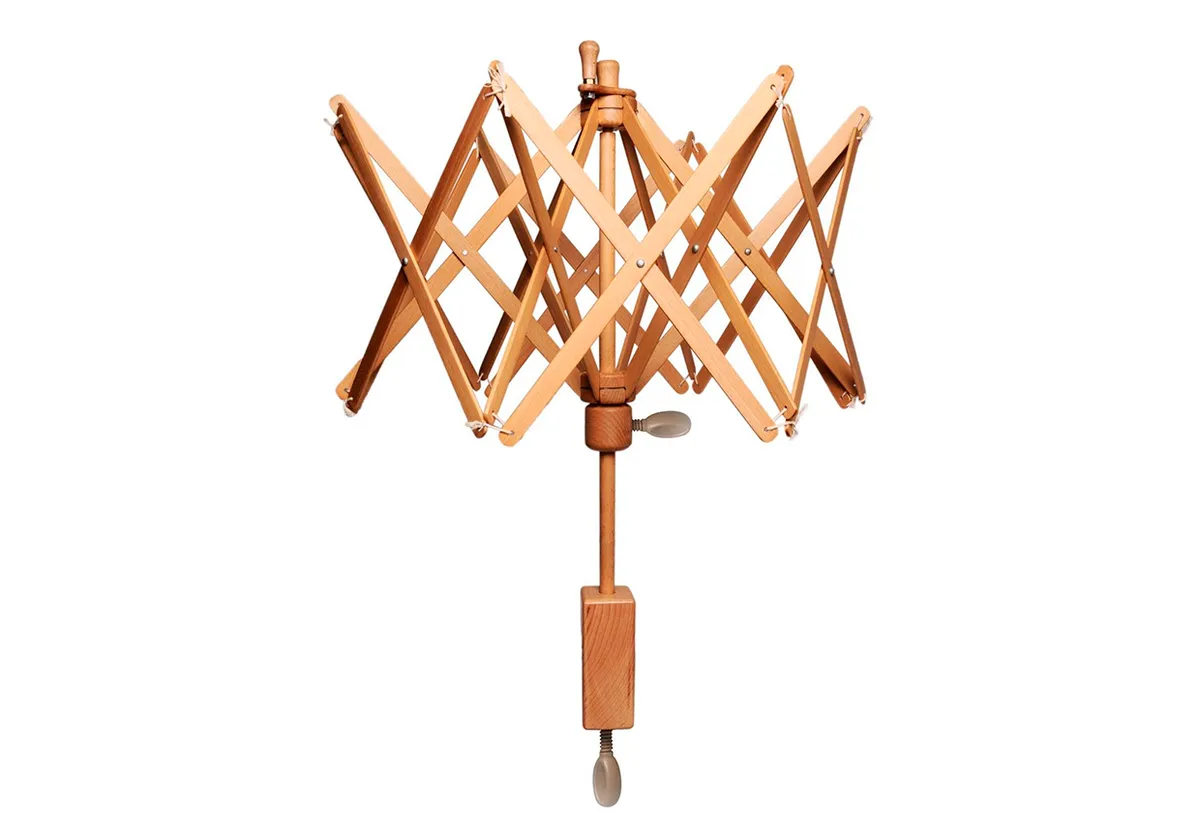
- Pros Trusted KnitPro brand
- Cons Plastic stoppers, string connections
Here's another natural Birch wood umbrella yarn swift by the legendary KnitPro. It has some plastic stoppers to make adjusting the umbrella width and height a bit easier, as well as a nice turned top handle for if you want to manually control the speed of your spin.
Shop the KnitPro Skein Winder Natural Swift here
Skein Winder Spinning Wheel
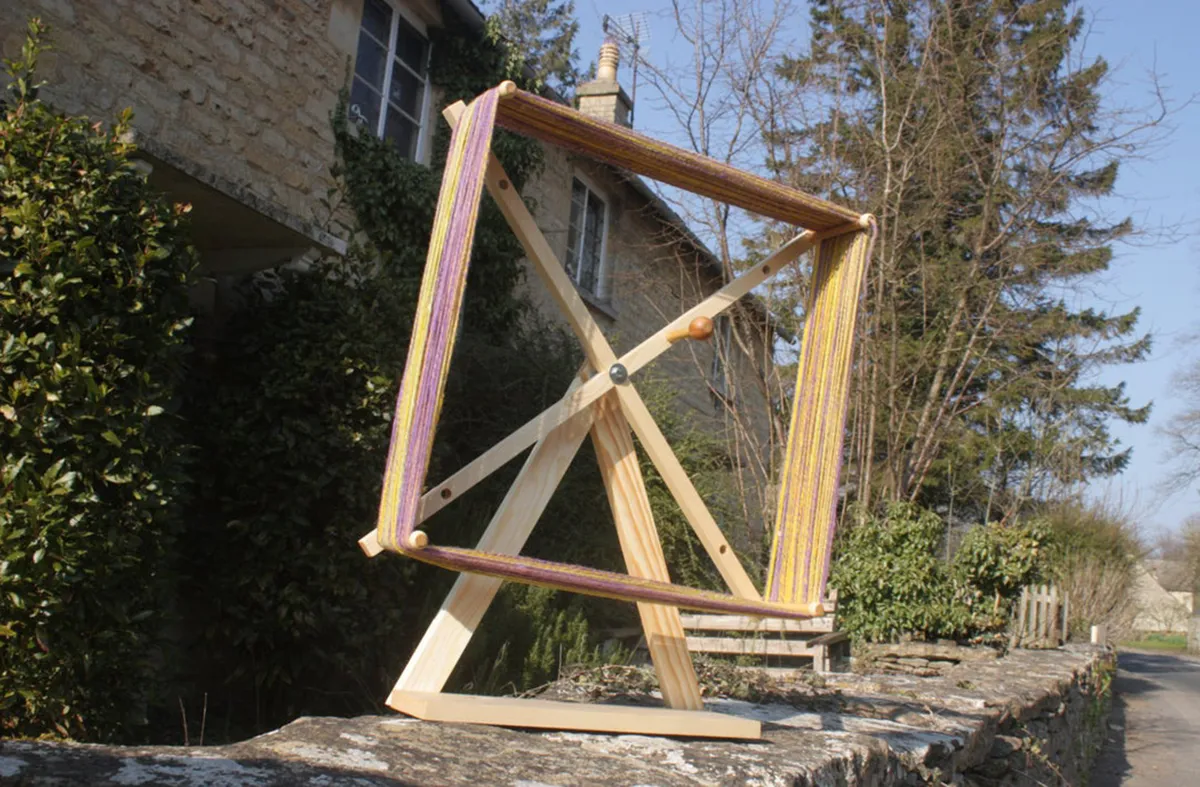
- Pros Fun design, handmade
- Cons Requires space, more suited to spinners
Here's a yarn swift with a bit of a difference! This handmade skein winder spinning wheel is the sort of tool that would traditionally be used with a spinning wheel to create a skein, but as it's essentially just an table top (Amish-style) swift there's no reason you can't use it for winding your yarn for knitting and crochet too!
They're handmade to order and there's extra options for adding additional clamps or extra holes to account for different skein sizes.
Shop the Skein Winder Spinning Wheel here
Other Yarn Winder Products
While yarn winders and yarn swifts are the most common way of transforming skeins into balls, there are a few other interesting products that are great for winding yarn.
Nostepinne Yarn Winder

While you may not have heard of a Nostepinne before, they're actually the traditional way of winding yarn into a ball. Essentially a wooden dowel, you wrap the yarn around the Nostepinne to create centre-pull balls, and are especially good for if you are wanting to separate a larger ball of yarn into smaller balls.
These lovely ones from Etsy come in natural and coloured wood varieties with an easy-grip turned handle. Using a Nostepinne does require a specific winding technique which you can find tutorials for on Youtube, and will give your arms a good workout!
Shop the Nostepinne Yarn Winder here
Moon on a Stick Yarn Holder
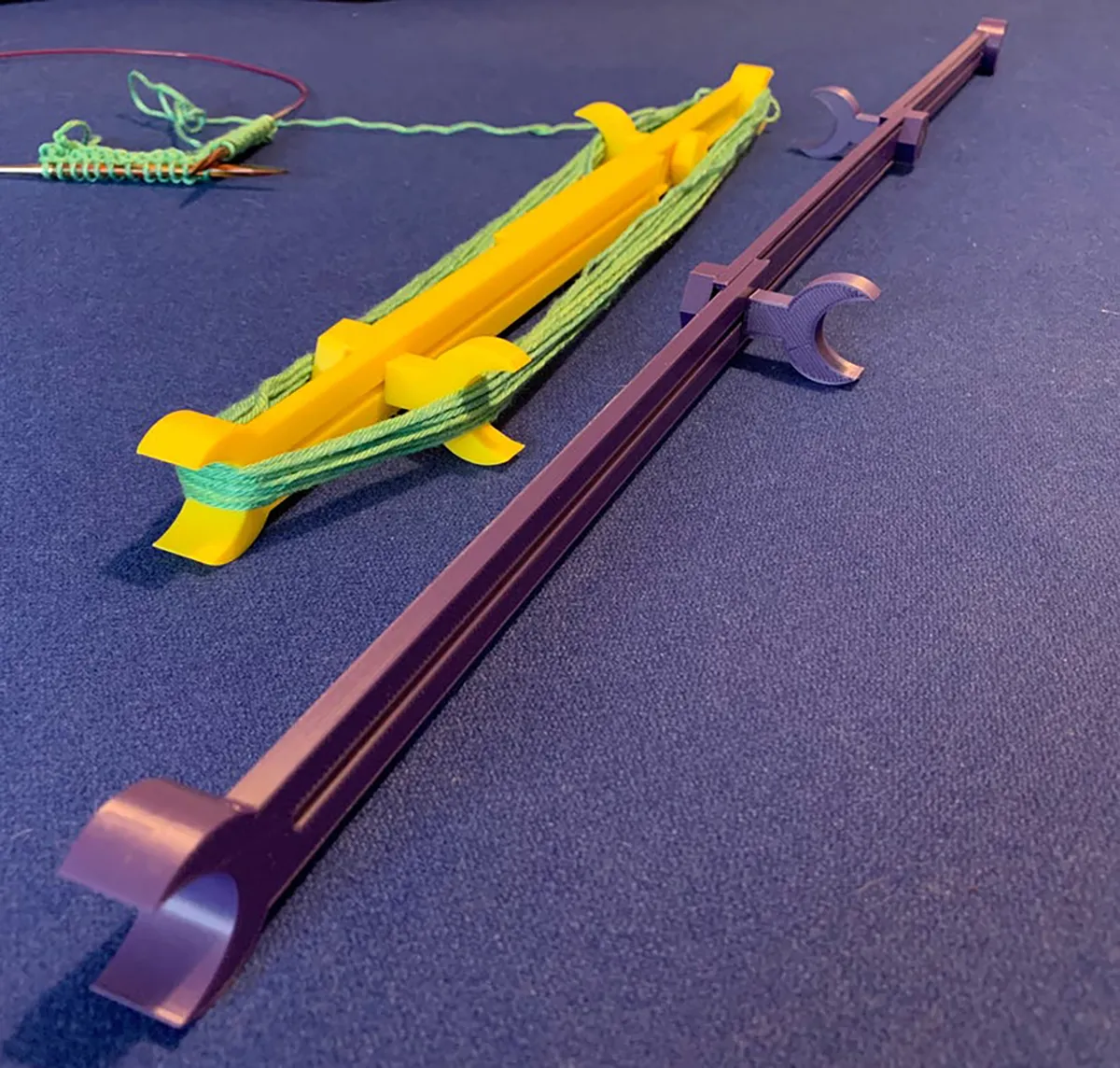
Here's a clever little product that recently caught our attention! We love little mini-skeins as they're a great way of sampling indie-dyers yarn or for working different coloured yarns into a project, however sometimes mini-skeins can be a little tricky to put onto a full size yarn swift.
This ingenious and expandable 'Moon on a Stick' yarn holder enables you to simply place your skein on the holder, then work directly from it rather than winding it into a ball! And if you really fall in love with this product, there's also an optional 100g adapter kit so that you can use it with your big skeins too!
Shop the Moon on a Stick Yarn Holder here
Bobbin Yarn Winder
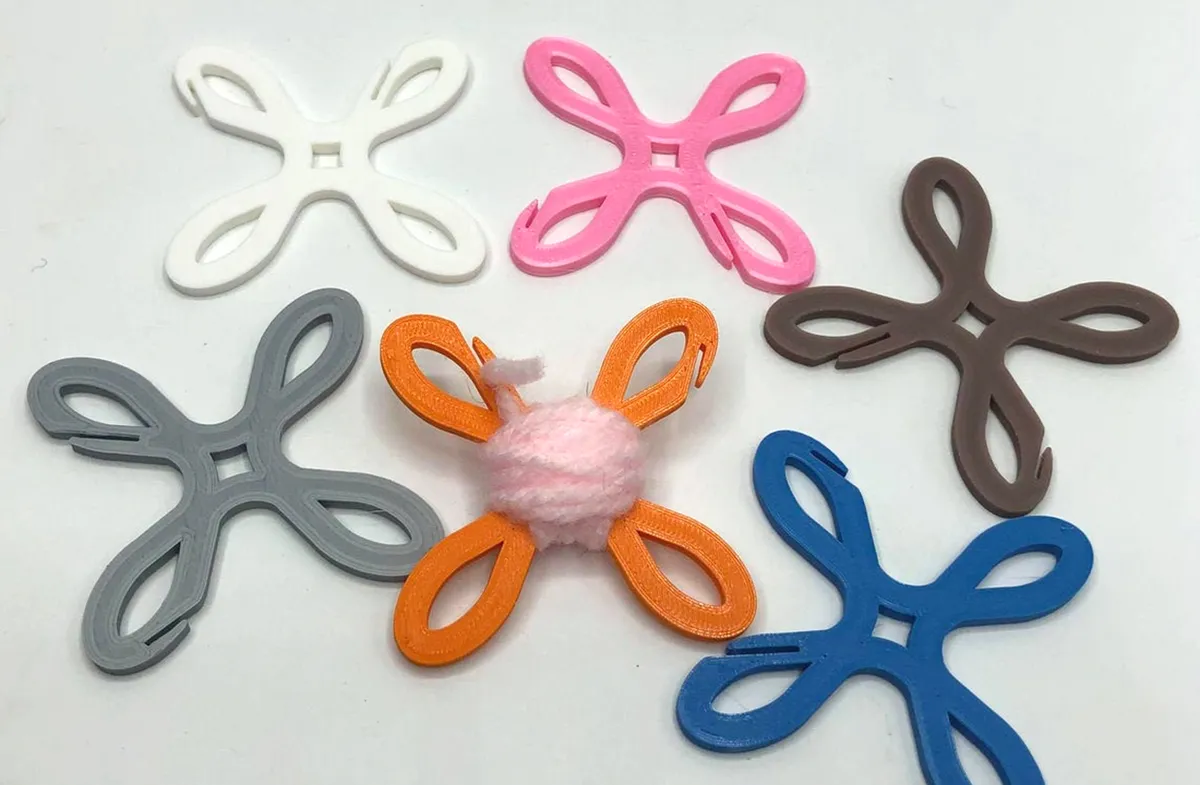
If you've got left-over bits of yarn getting all tangled in a drawer, or need to use multiple sections of colour for intarsia crochet, these clever bobbin yarn winders are a brilliant solution, and come as a pack of 6!
Once you've wound your yarn around the bobbin, there's also handy notches to catch the end of the yarn so it won't unravel itself - we could definitely do with some of these for our yarn stash!
Shop the Bobbin Yarn Winder here
Pony Yarn Winder Bobbins
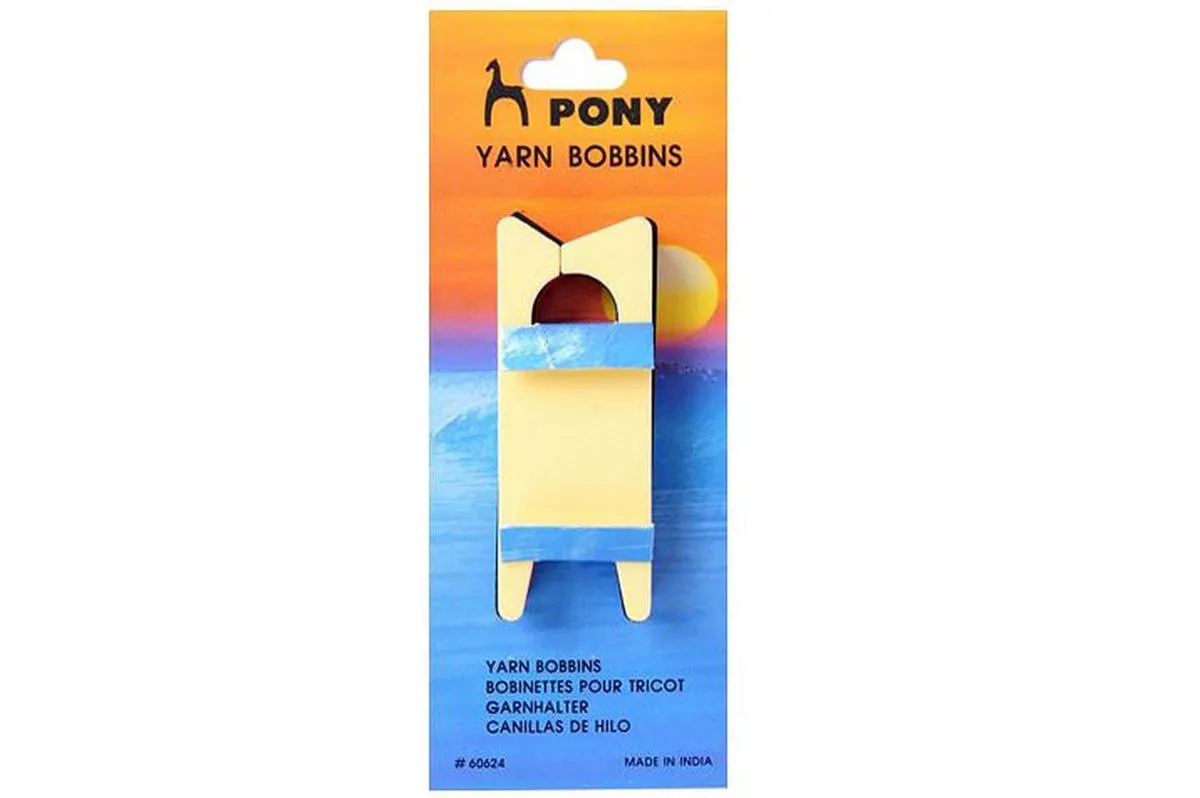
If you though the yarn bobbins above were a clever idea, but you like to use loads of colours in your intarsia knitting or crochet, then why not grab this pack of 210 plastic bobbins to wind all your different coloured yarns onto!
Shop the Pony Yarn Winder Bobbins here
Mini Niddy Noddy Yarn Winder
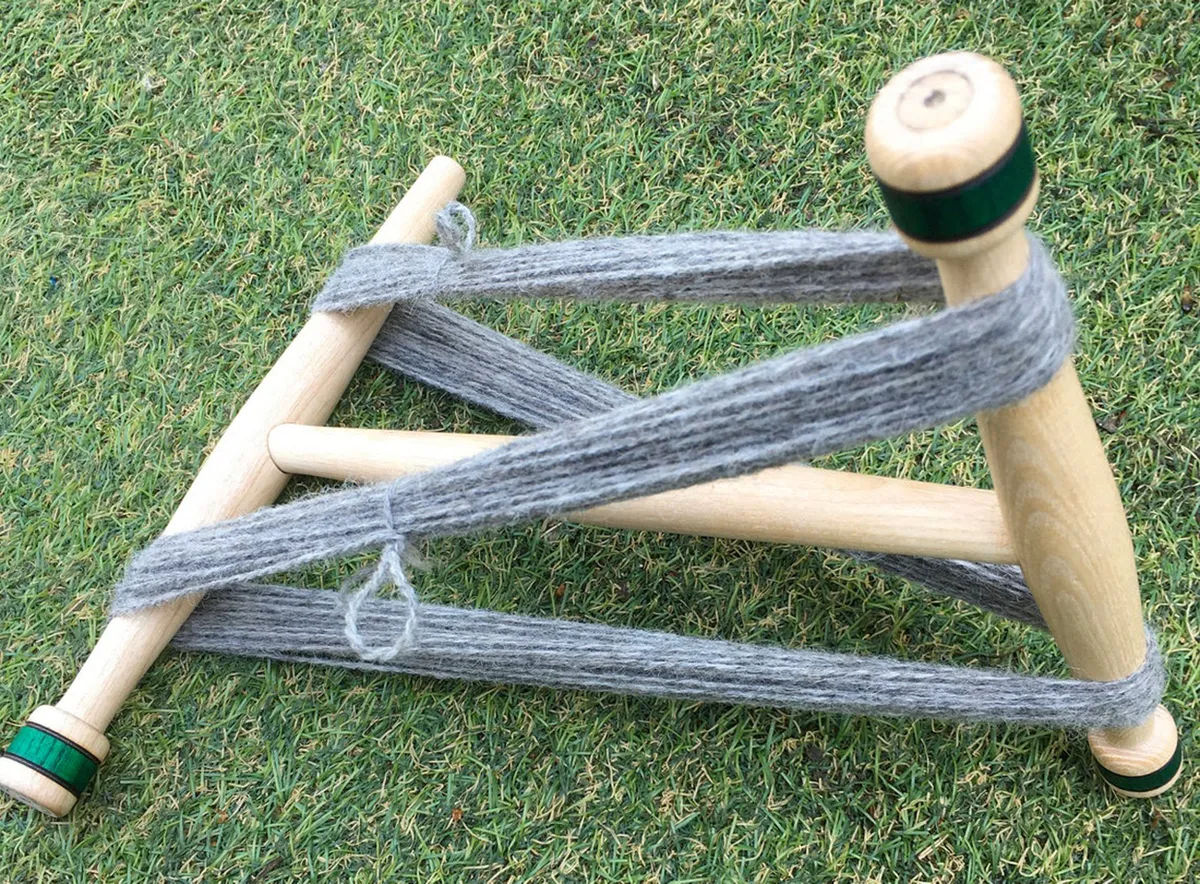
Here's another product that is really designed for spinners and indie dyers, but we found it so interesting that we just had to include it! Called a Niddy Noddy, this intriguing product is used for winding yarn into a skein, making 1 metre lengths when wrapped once around the Niddy Noddy.
In reality it's not really going to be much use for most knitters and crocheters, but if you're a hand-dyer or spinner it might be just the product you need!
Shop the Mini Niddy Noddy Yarn Winder here
Choose the right wool winder to suit your needs
Budget is likely going to be an important factor when it comes to choosing a wool winder or yarn swift, but it's also worth considering how you're likely to use your winder too.
If it's something you're only realistically going to use every now and then, you probably don't need expensive professional kit. Whereas if you almost exclusively work from yarn skeins or want your yarn winder always ready to roll, then you'll probably appreciate a table top wider or a particularly sturdy swift.
Assemble your essential crochet kit
Getting the essential crochet kit doesn't have to cost the earth, in fact sometimes even just small things like picking the right style of yarn needle can make a world of difference.
Take a look at these top crochet accessories with Gathered.


